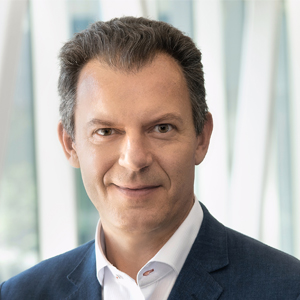REIMAGINING THE FUTURE
Through this interview, Vincent Poitout, Director of Research at the CHUM and Scientific Director of the CHUM Research Centre (CRCHUM), helps us better understand the work accomplished by our research teams and their contribution to global scientific efforts to deal with the many challenges created by the COVID‑19 pandemic. He refers to the importance of collaboration and knowledge sharing at the global level in the fight against SARS-CoV-2 and gives us pointers for the future.
How would you describe our research community’s reaction to the pandemic? What are the main lessons learned from this experience?
Our community reacted with remarkable agility and creativity to adapt to the health emergency, make changes in their regular research programs and quickly implement projects to address scientific questions raised by the pandemic.
Through their intense mobilization, our research teams were, and still are, at the scientific forefront in many relevant fields, such as virology, immunology, epidemiology and public health. The CHUM’s teams and their steadfast support for our research projects involving patients also allowed us to contribute significantly to generating knowledge.
Despite the slowdown in basic research and early clinical trial activities, I believe it’s important to remember the incredible solidarity and resilience of our entire research community: researchers, students and research support staff.
Our community managed to get through the first year of the pandemic by standing together and actively contributing to the fight against the coronavirus.

Dr. Vincent Poitout
Director of Research at the CHUM
Scientific Director of the CRCHUM
How does our research contribute to the provincial and federal approaches to the health crisis?
The contribution of the teams at our research centre is very important for both levels of government where they are involved in managing the pandemic.
At the provincial level, several CRCHUM researchers are closely involved in decisions related to public health, monitoring SARS‑CoV‑2 variants and vaccination policies. Others provide information and advice to governing bodies, whether it be the Ministère de la Santé et des Services sociaux, the Fonds de recherche du Québec or Université de Montréal.
Examples at the federal level include Nathalie Grandvaux, who is regularly consulted by the House of Commons Standing Committee on Health, and her colleague, André Finzi, who is very involved in various national committees interested in infection by SARS‑CoV‑2, vaccination and immunity.
How important is global cooperation in the scientific community, and what manifestations of this have you seen at the CRCHUM?
Even though we haven’t quantified it, the use of preprint servers to make research data freely available to the global scientific community has greatly increased. This grassroots movement is not about to stop. Widely used in physics and chemistry for years, preprints have seen little use in the biology and health science fields up to now.
Similarly, the scientific publishing model has changed. There is a real desire among the community to have data quickly available and free of copyright restrictions, and both funding bodies and institutions, including Université de Montréal, have open access policies. The way our discoveries are communicated and evaluated is changing.
Due to the pandemic, more research teams worked in an open-science context. This was the case with, for example, the CODA‑19 project, a large collection of clinical, laboratory and radiology data headed by Dr. Michaël Chassé in collaboration with nine other hospitals in Quebec and Ontario.
These data will help develop machine learning models able to diagnose COVID‑19 early, identify patients at high risk of clinical deterioration or death, and help doctors make the best treatment decisions.
During the pandemic, misinformation was widespread. In terms of science communications, do you think that the facts were communicated effectively to the public, and what do you think our researchers’ role is in this regard?
In general, there were efforts at communication, but sometimes there were inappropriate mixes of scientific data and political considerations. This created confusion in people’s minds.
In certain media outlets, some scientists, using the authority of their titles, discussed subjects that were not in their area of expertise. In my mind, pseudo-experts are the real danger. Their words are unfortunately fodder for conspiracy theorists and contribute to additional misinformation.
To fight fake news, the Research Centre is committed to providing the public with validated scientific facts and evidence. This collective duty and personal responsibility is shared by our researchers, who have rightfully spoken out and allowed science to converse with the public.
Do you think that the pandemic will change the way the world of research operates? What do you think we should expect for the future?
Governments’ investment priorities will change in the years to come. With the current pandemic, I hope that our decision makers have gauged the importance of investing ahead of time to generate knowledge and be ready to act when the need arises.
However, it will be important to ensure that these investments aren’t made at the expense of other important population health goals. This past year, a lot of money has been invested in COVID research, while research into cardiovascular disease, cancer, diabetes, etc., which affect many Canadians, remains underfunded.
With an economy to rebuild, Canada intends to ensure its supply capacity and production autonomy for several strategic products, such as vaccines, certain drugs, and personal protective equipment. In the latest federal budget, a total of 2.2 billion dollars over seven years was reserved for the biomanufacturing and life sciences sector. Will that result in investments in basic research? I hope so!

Christine Bellefeuille
Depuis plus d’un an, le tiers de la population active canadienne est en télétravail. Productifs depuis leur domicile, la majorité des télétravailleurs entend bien adopter cette façon de vivre le travail une fois la pandémie maîtrisée.
« La pandémie sera vécue comme une cassure, rappelle Christine Bellefeuille, conseillère senior en ressources humaines. Entre ce qui se faisait avant et aujourd’hui, ce que l’on prenait pour acquis! Malgré ses limites connues comme l’isolement professionnel et social, le télétravail va devenir la norme. Des aménagements en matière de flexibilité des horaires et de la conciliation travail-vie personnelle sont bien sûr à prévoir. »
Au CRCHUM, l’équipe des ressources humaines a fait preuve de résilience et a su accompagner les gestionnaires et les rassurer sur la capacité de leurs employés à s’autogérer. « Tant qu’il y a du respect, de l’écoute, de l’empathie et un bon service à la clientèle, cela fonctionne. Même à distance! »
Et, de l’empathie et de la compassion, il en a fallu à l’équipe RH qui a su guider et soutenir dans leurs démarches des membres endeuillés de la grande communauté du CRCHUM. Au-delà de la suite de chiffres quotidiens annoncés par les médias, les décès ont un visage familier.
« La reconnaissance de la recherche comme une activité essentielle est une excellente chose. Sa mise à l’avant-plan dans l’avancement des connaissances pendant plus d’un an aussi, notamment pour le recrutement de la relève. »
Avec ou sans pandémie, la vie continue. Différemment.


